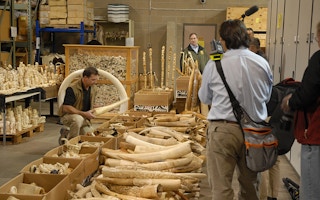Large-scale seizures of ivory in Singapore over the last three years make the south-east Asian city-state one of the world’s premier ivory smuggling hubs for organised crime, say conservation watchdogs.
Data from seizures, collected by the UN’s wildlife trade monitor Traffic and the Environmental Investigation Agency (EIA) and shared with the Guardian, reveals how the gangsters operate. Shipping containers carrying thousands of tusks are labelled as carrying anything from tea to waste paper or avocados. They leave Africa from a few ports well-known for high levels of corruption.
Customs officials in China and Hong Kong – where most ivory ends up – target containers which have come from those ports. In order to get around this, according to EIA director of campaigns Julian Newman and traffic wildlife trade expert Tom Milliken, ivory shipments are being dropped off in transit ports, such as Singapore or Port Klang in Malaysia, where they can sit for months before being loaded on to a new vessel with paperwork listing a new port of origin.
“You’d probably get a red flag if you were shipping dried fish from Africa to Hong Kong,” said Newman. “But if it came from Malaysia then it wouldn’t. There’s lots of loopholes that people are able to exploit to try and get their stuff through customs control.”
Vietnam, Thailand and Malaysia are the transit countries traditionally favoured by the gangs. Between 2010 and today, the EIA recorded these countries seizing a total of 32, 18 and 14 tonnes of ivory respectively.
“
We will continue our enforcement efforts, to prevent Singapore from being used as a transit point.
Desmond Lee, senior minister of state for national development and home affairs, Singapore
By comparison, there had been relatively few seizures in Singapore for more than a decade before 2013. Since then, authorities have made four large seizures of 1.8 tonnes, 1 tonne, 3.7 tonnes and 0.5 tonnes – all of which Singapore crushed in a display of defiance against the trade.
The speed at which the syndicates have established themselves in the city-state has caught the attention of wildlife trade experts such as Milliken. “Singapore literally came out of nowhere and became a country of primary concern. It’s not a lot of seizures but the ones that occurred were a large volume of ivory,” he said. Amounts of half a tonne and above indicate the involvement of criminal gangs.
Organised crime is a key threat to elephant survival, said Milliken, because of the huge volumes they are able to ship at once. The payoffs are huge and the consequences usually minimal. Traffic estimates that more than 95 per cent of illegal shipments evade officials. Arrests are rare. As a result elephant poaching in Africa has exploded since 2008 with catastrophic results in countries such as Tanzania where the population dropped 60 per cent from 2009 to 2014.
Milliken has prepared a report for next month’s critical wildlife summit – the Convention on International Trade in Endangered Species (Cites) conference in South Africa – in which he names Singapore as “a country of primary concern”. The conference will consider whether to put Singapore on a list of worst offending countries that are required to submit a plan for controlling the trade and overseen by their peers.
A spokesperson for the Singaporean Agri-Food and Veterinary Authority said the agency was reviewing the recommendation made to Cites and that Singapore used “a multi-pronged approach to weed out illegal wildlife trade”. They would not comment on the apparent renewed presence of criminal gangs.
In June, when the country crushed its seized ivory, senior minister of state for national development and home affairs Desmond Lee said: “Tackling this illicit trade requires close international cooperation, and also the assistance of the public and NGOs. We will continue our enforcement efforts, to prevent Singapore from being used as a transit point.”
This story was originally published by Chinadialogue under a Creative Commons’ License and was republished with permission. Read the full story.










